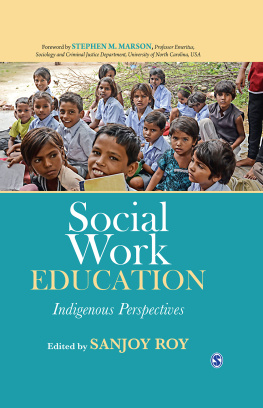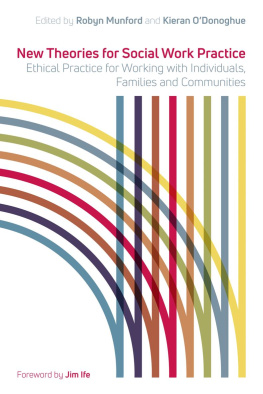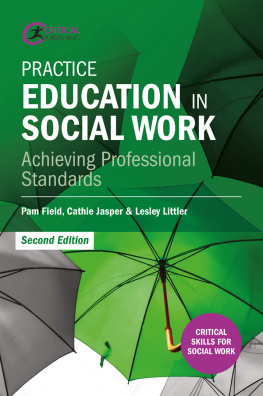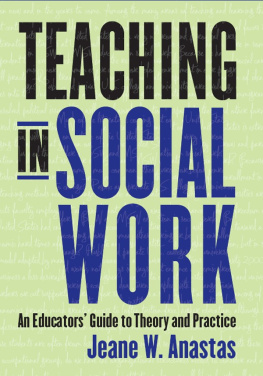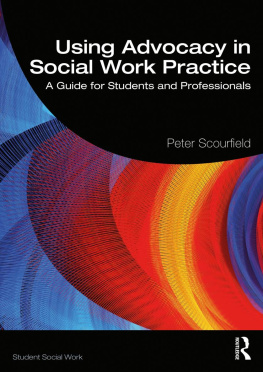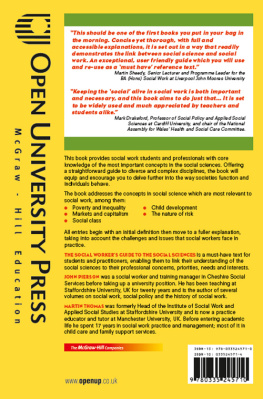SAGE was founded in 1965 by Sara Miller McCune to support the dissemination of usable knowledge by publishing innovative and high-quality research and teaching content. Today, we publish over 900 journals, including those of more than 400 learned societies, more than 800 new books per year, and a growing range of library products including archives, data, case studies, reports, and video. SAGE remains majority-owned by our founder, and after Sara's lifetime will become owned by a charitable trust that secures our continued independence.
Los Angeles | London | New Delhi | Singapore | Washington DC | Melbourne
Social Work EDUCATION
Social Work EDUCATION
Indigenous Perspectives
Edited by

CopyrightSanjoy Roy, 2021
All rights reserved. No part of this book may be reproduced or utilized in any form or by any means, electronic or mechanical, including photocopying, recording or by any information storage or retrieval system, without permission in writing from the publisher.
First published in 2021 by
SAGE Publications India Pvt Ltd
BI/I-I Mohan Cooperative Industrial Area
Mathura Road, New Delhi 110 044, India
www.sagepub.in
SAGE Publications Inc
2455 Teller Road
Thousand Oaks, California 91320, USA
SAGE Publications Ltd
I Oliver's Yard, 55 City Road
London ECIY ISP, United Kingdom
SAGE Publications Asia-Pacific Pte Ltd
18 Cross Street #10-10/11/12
China Square Central
Singapore 048423
Published by Vivek Mehra for SAGE Publications India Pvt Ltd. Typeset in 10.5/13 pt Bembo by Zaza Eunice, Hosur, Tamil Nadu, India.
Library of Congress Control Number: 2020948144
ISBN: 978-93-5388-638-7 (ePub)
SAGE Team: Rajesh Dey, Shipra Pant and Rajinder Kaur
To
all the graduate, postgraduate students, research scholars
and practitioners
of social work and allied disciplines
who are actually working as the change agents.
Thank you for choosing a SAGE product!
If you have any comment, observation or feedback, I would like to personally hear from you.
Please write to me atcontactceo@sagepub.in
Vivek Mehra, Managing Director and CEO, SAGE India.
Bulk Sales
SAGE India offers special discounts
for purchase of books in bulk.
We also make available special imprints
and excerpts from our books on demand.
For orders and enquiries, write to us at
Marketing Department
SAGE Publications India Pvt Ltd
B1/I-1, Mohan Cooperative Industrial Area
Mathura Road, Post Bag 7
New Delhi 110044, India
E-mail us atmarketing@sagepub.in
Subscribe to our mailing list
Write tomarketing@sagepub.in
This book is also available as an e-book.
List of Figures
- 41
- 42
- 60
- 72
- 73
- 74
- 80
- 112
- 113
- 169
- 185
- 191
- 195
List of Abbreviations
- ACA American Counselling Association
- AIDS Acquired Immune Deficiency Syndrome
- ALIMCO Artificial Limbs Manufacturing Corporation of India
- BAC British Association for Counselling
- BBB Build Back Better
- BPRD Bureau of Police Research and Development
- CASW The Canadian Association of Social Workers
- CB Civil Defense
- CBRN Chemical, Biological, Radiological and Nuclear
- CHC Community Health Centers
- CISM Crisis Incident Stress Management
- CMS Centers for Medicare and Medicaid Services
- CNS Central nervous system
- DISE District Information System for Education
- DM Disaster management
- DRC Drug De-addiction and Rehabilitation Centres
- DRR Disaster risk reduction
- GER Gross enrolment ratio
- GOI Government of India
- HIV Human Immunodeficiency Virus
- HVCR Hazard, Vulnerability, Category and Risk
- IASC Inter-agency Standing Committee
- IASSW International Association of Schools of Social Work
- ICDS Integrated Child Development Services
- IDNDR International Decade for Natural Disaster Reduction
- IFSW International Federation of Social Workers
- IGNOAPS Indira Gandhi National Old Age Pension Scheme
- IIPA Indian Institute for Public Administration
- IPOP Integrated Programme for Older Persons
- LIC Life Insurance Corporation
- MBA Master of Business Administration
- MDG Millennium Development Goals
- MHFA Mental Health First Aid
- MoSPI Ministry of Statistics and Programme Implementation
- NAPCC National Action Plan on Climate Change
- NASW National Association of Social Workers
- NCRB National Crime Records Bureau
- NDMA National Disaster Management Authority
- NDPS Narcotic Drugs and Psychotropic Substances
- NDRF National Disaster Response Force
- NFHS National Family Health Survey
- NGO Non-governmental organization
- NHS National Health Service
- NNPC Neighborhood Network in Palliative Care
- NOVA National Organization for Victim Assistance
- NPDM National Policy on Disaster Management
- NPDRR National Platform for Disaster Risk Reduction
- NPHCE National Programme for Health Care of the Elderly
- NPOP National Policy on Older Persons
- OD Organization development
- PAR Participatory action research
- PDR People's Democratic Republic
- PFA Psychological First Aid
- PHC Primary health centers
- PIP Programme Implementation Plans
- PMVVY Pradhan Mantri Vaya Vandana Yojana
- SC Sub-centers
- SDG Sustainable development goals
- SDMA Sate Disaster Management Authority
- SDTT Sir Dorabji Tata Trust
- SFA Stress First Aid
- SRS Sample Registration System
- TISS Tata Institute of Social Sciences
- U5MR Under-5 Mortality Rate
- UN United Nation
- UNCRC United Nations Convention on the Rights of the Child
- UNDP United Nations Development Programme
- UNICEF United Nation Children's Fund
- UNIFEM The United Nations Development Fund for Women
- UTs Union territories
- WHO World Health Organization
Foreword
India has an impressive cultural history of care for the troubled that extends long before the existence of formal social work education (Chatterjee, 2010). Raja Ram Mohan Roy, well known within India, but unfortunately unrecognized within the Western world, made profound strives towards advocacy for humanity and educational resources. He instigated a reform movement to engage Indians to embrace values that stressed kindness and generosity to those who are less fortunate. Internationally revered, Mahatma Gandhi was the fountainhead who demonstrated and guided Hindu culture to what, today, embodies social work values. In fact, Gandhi has had the single most profound impact on the articulation of contemporary social work values and ethics of any single person in world history. Clearly, India has a solid history of advocacy for humanity followed by efforts to systematize such humanitarian concerns within the academic arena. For example, the internationally respected

